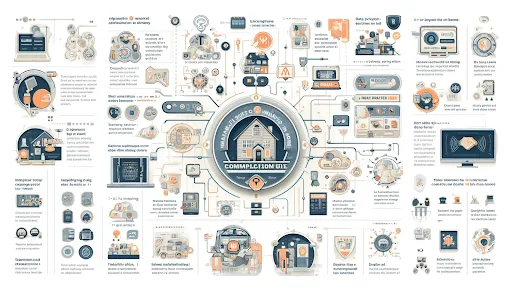Artificial Intelligence (AI) is transforming homes into smart living spaces, providing convenience, efficiency, and security. This blog post explores how AI is being used in smart homes, its benefits, challenges, and future trends.
Understanding AI in Smart Homes
AI in smart homes involves using machine learning algorithms and data analysis to automate and optimize various home functions. Key applications include:
- Home Automation: AI controls home devices such as lighting, thermostats, and appliances.
- Security Systems: AI enhances home security through smart cameras, alarms, and access control.
- Energy Management: AI optimizes energy consumption by monitoring and adjusting usage patterns.
 |
| Illustration of AI applications in home automation, security systems, and energy management. |
Image Prompt: AI applications in smart homes.
Key Benefits of AI in Smart Homes
AI offers several benefits in smart homes, such as:
- Convenience: AI automates routine tasks, making home management easier and more convenient.
- Energy Efficiency: AI optimizes energy use, reducing costs and environmental impact.
- Enhanced Security: AI provides advanced security features that protect homes and occupants.
Image Prompt: Benefits of AI in smart homes.

Challenges of AI in Smart Homes
Despite its benefits, implementing AI in smart homes faces several challenges, including:
- Data Privacy: Ensuring the privacy and security of data collected by smart home devices is crucial.
- Interoperability: Integrating various smart home devices and platforms can be complex.
- Cost: The initial investment in AI technology can be high for some homeowners.
 |
| Infographic outlining the challenges of implementing AI in smart homes, including data privacy and interoperability. |
Image Prompt: Challenges of AI in smart homes.
Real-World Applications of AI in Smart Homes
AI is being applied in various smart home technologies, such as:
- Smart Thermostats: AI-powered thermostats learn user preferences and adjust temperature settings automatically.
- Voice Assistants: AI-driven voice assistants, like Alexa and Google Assistant, control smart home devices and provide information.
- Smart Lighting: AI systems manage lighting based on occupancy, time of day, and user preferences.
 |
| Examples of AI applications in smart thermostats, voice assistants, and smart lighting. |
Image Prompt: Applications of AI in smart homes.
Future Trends in AI in Smart Homes
The future of AI in smart homes involves several trends, including:
- AI-Enhanced Appliances: AI will continue to improve home appliances, making them smarter and more efficient.
- Integrated Ecosystems: AI will enable seamless integration of smart home devices into a unified ecosystem.
- Health Monitoring: AI-driven health monitoring systems will track wellness and provide alerts for potential health issues.
 |
| Illustration of future trends in AI in smart homes, including AI-enhanced appliances and integrated ecosystems. |
Image Prompt: Future trends in AI in smart homes.
Conclusion
AI is transforming homes into smart living spaces, offering convenience, efficiency, and security. By addressing current challenges and leveraging future trends, AI has the potential to revolutionize how we live and interact with our homes.
 |
| Graphic summarizing the potential and future of AI in smart homes. |
SEO Keywords: AI smart homes, smart home technology, AI home automation, AI in homes, AI smart devices, AI home applications, AI smart home benefits, AI smart home trends, AI smart home systems, AI home innovation, AI connected homes, AI home solutions, AI smart home development, AI in home automation, AI smart home future, AI smart home examples, AI home security, AI smart home industry, AI home technology, AI smart living.







Comments
Post a Comment